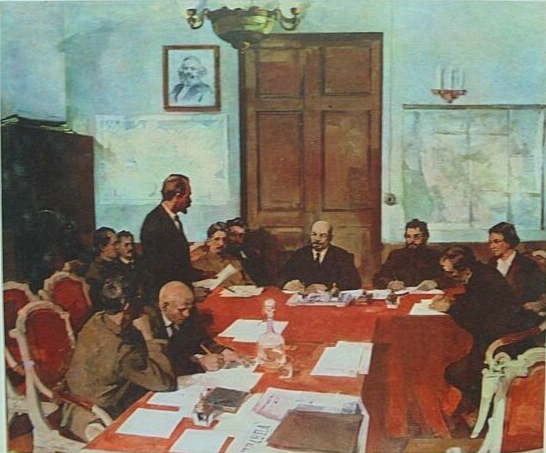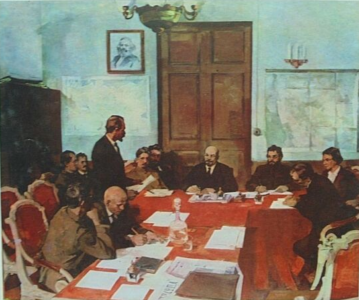Parker McQueeney writes in support of Constitution/Bylaw Amendment 8 (CB8) for the 2021 DSA Convention
At this year’s convention, DSA will be debating a political platform. For the US socialist movement, this is a significant step forward. Rather than an amorphous view of socialism, the organization will (if and when the platform is passed) adopt a concrete set of demands that outline our long term goals and a rough draft of a road map for the working class to take power in society. Adopting a platform is also a major step towards building a mass socialist party. While DSA could be said to have had a limited political program1 during the two Bernie Sanders campaigns, in the form of Bernie’s platform, this era has receded and it is now time to consolidate our own demands and vision.
It is not surprising that the adoption of a political platform is something that DSA members fundamentally support. At the 2019 convention, a resolution was passed calling for the NPC to adopt a two-year process of building a political platform. In this process, a feedback survey was sent out between the first and second drafts which got between five and six hundred responses, and included 1-10 rankings for each section. The vast majority of respondents rated all planks highly, and by all accounts the second draft has only been an improvement upon the first. It is therefore very likely that, despite hangups individuals and factions may have with certain parts of the draft, the platform draft will be accepted by delegates. This could very well be the most significant development to come out of the 2021 convention.
That said, the role of the platform is ill-defined. There is a danger of it being adopted as an official document, going up on the website, and then being promptly forgotten about. Such was the fate of the quasi-programmatic 2016 article “Resistance Rising”, the existence of which most active DSA members are probably unaware of. One constitutional amendment proposal, put forward by Marxist Unity (a faction of which I am a member) aims to prevent this.
The constitutional amendment (CB8) is simple. It reads
“Membership shall be open to every person who
subscribes to the principles of the organizationaccepts the national political platform of the organization. Acceptance does not mean agreement with every point of the platform, and members are free to organize within DSA to make specific changes to the platform. Rather, it means committing to fight for the platform as the overall expression of the movement’s aims”.
We don’t propose this, as some of the more outlandish critics claim, in order to lay the ground for expulsions for people whose politics we don’t like. DSA is not in the habit of liberally handing out expulsions – nor should it ever be. In fact, by concretizing the vague and undefined “principles of the organization”, CB8 actually helps to prevent groundless purges. Under the current language, anything can be pointed to as violating ‘DSA principles’, though thankfully the healthy democratic norms of the organization have thus far prevented this. Nor is the point of this proposal to force every new DSA applicant to read through our program entirely, which, based on the word count on the second draft of the platform, would only add 25 minutes to the application process. New DSA members should indeed be encouraged to read our political platform – and chapter political education working groups should periodically host discussions of it.
The platform will likely be a good educational document that provides a rough road map to what the working class taking political power – socialism – would entail. But we don’t propose that applicants must submit a multiple question scantron to prove they have read it. It is doubtful that passing CB8 will create a slump in membership applications, as some comrades worry. Since 2017, DSA’s growth has largely been an accompaniment of class struggle advancing in some way, in politics or otherwise. New comrades know where DSA stands in the class war. Our organizing campaigns stem from our programmatic views which existed before they were formalized into a political platform draft. People join DSA because they accept (and are inspired by) the ‘general aims’ of the organization. In this sense, CB8 is just formalizing what is already true: membership in DSA is based on accepting the overall aims of our movement.
Agreement or acceptance?
The reason we write “acceptance” rather than “agreement” should be obvious from the wording of the amendment. Acceptance implies comrades are free to disagree with anything in the platform, and argue for removing, replacing, or adding whatever they see fit. But it is worth fleshing this out. Throughout the 20th Century, most socialist groups were organized around agreement with a series of increasingly arcane theoretical lines: parties separated themselves from each other based on whether they saw the Soviet Union as a degenerated workers state, state capitalism, bureaucratic collectivism, on their specific interpretations of the transitional program, etc. These groups have unity which can be described as “tactical intransigence, programmatic flexibility”. However, there is a better alternative to both theoretical agreement and complete undefinition of our politics. That is programmatic unity. Acceptance of a political platform/program with specific demands on the state is how the first mass socialist parties succeeded in winning the working class of their countries by the millions, including the Russian Social Democratic Labor Party, which led the world’s first socialist revolution. Here’s what the Marxist Karl Kautsky had to say about programmatic unity:
What holds political parties together – particularly when they have a great historical role to fulfill, such as the social democratic party – are its final goals, not its immediate demands; not ideas about how the party should behave regarding all the individual issues that confront it. Differences of insight, temperament, interests, tradition and so on can be found within every party; they will result in the most varied differences of opinion. Naturally, these differences can only relate to some of the party’s immediate tasks, not its final goals and not the method that is generally to be followed in achieving them. After all, without unity on these points, combining such disparate elements into a party would be an absurdity.
As I have argued, differences of opinion will always exist within a party, and on occasion they can reach a threatening pitch. But, the more lively the awareness of the great goals common to all party members, the more powerful the enthusiasm for them, the more difficult it will be for such differences to blow the party apart, with the demands and interests of the moment taking a back seat relative to the party’s goals. From this point of view as well, elections, which have an enlightening and incentivising effect, are invaluable for social democracy.2
In other words, for Kautsky, a political platform gives unity on our political demands for socialism without prescribing a narrow tactical route. It gives us a direly needed solidarity by concretizing our real political vision: we can bicker about tactics and our specific focus in any given time, but under the context of unity around a political platform. No one faction of DSA will be completely happy with the platform. It is necessarily a democratic compromise between all forces within the organization. It will also necessarily need to be updated as class struggle continues in the US and the socialist movement matures. Admittedly, CB8 will largely be a symbolic change that can be only upheld by individual socialists until we take further steps like making our politicians accountable to it. Yet it is still a necessary symbolism for the sake of a flexible but still principled unity in our organization. Vote yes on CB8.
- I use the terms ‘program’ and ‘platform’ interchangeably. There isn’t a standardized difference between them in the socialist movement, however in the era of the first mass socialist parties, “program” was used in Europe while ‘platform’ was used in the United States to refer to the same types of documents.
- Karl Kautsky on Democracy and Republicanism, Ben Lewis, Haymarket 2019.




